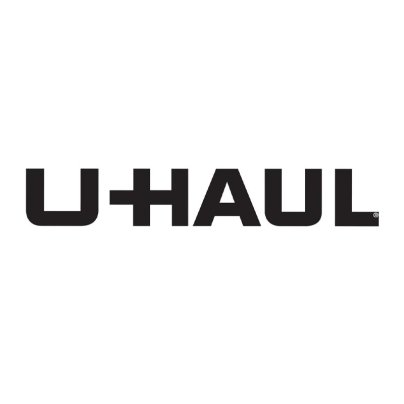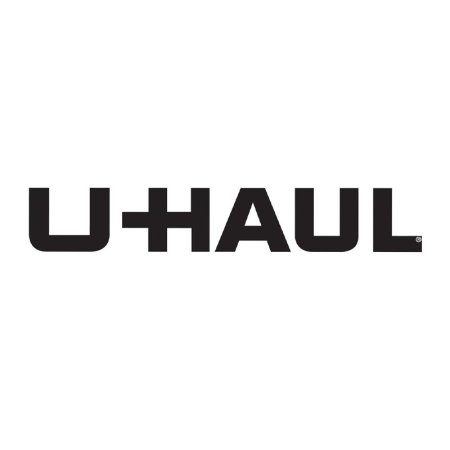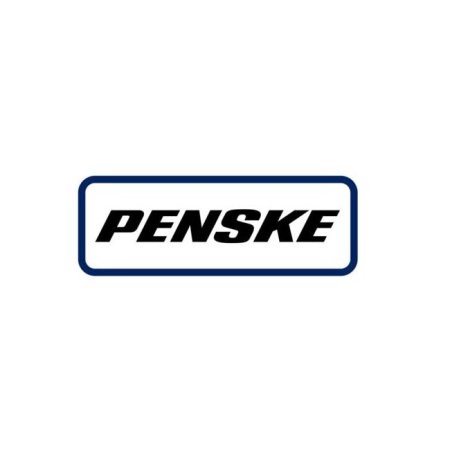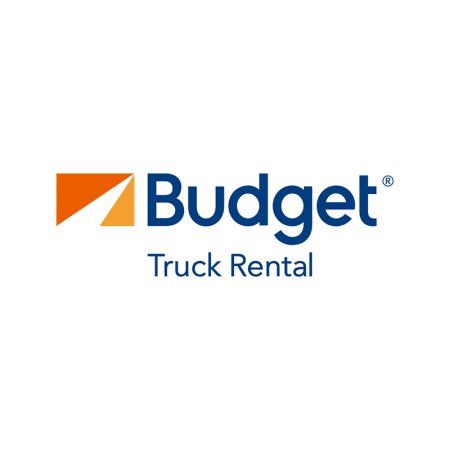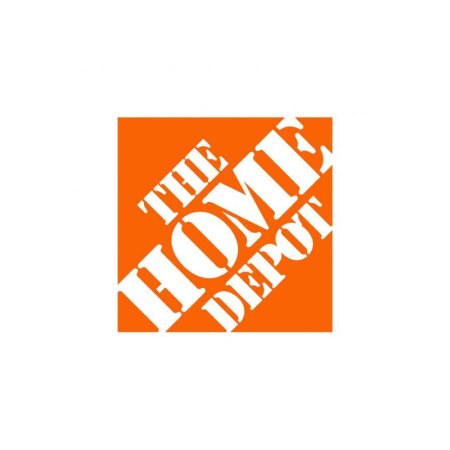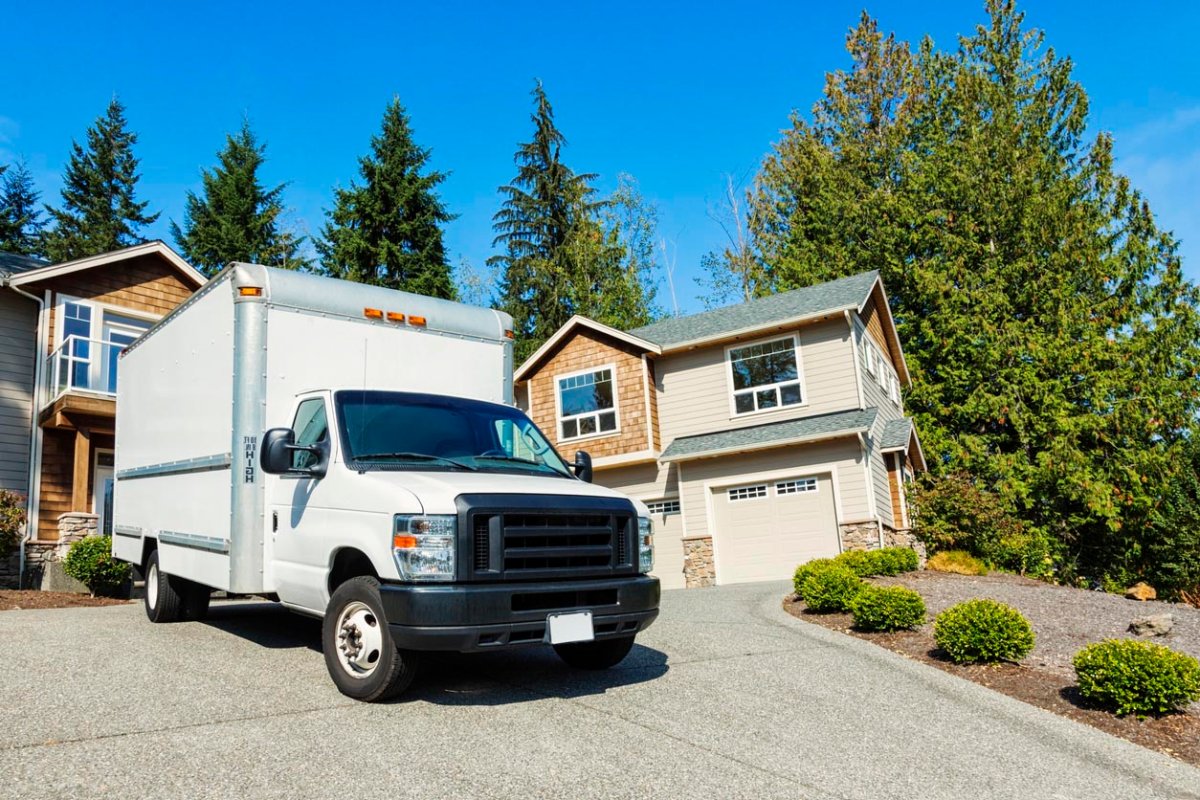
We may earn revenue from the products available on this page and participate in affiliate programs. Learn More ›
Hiring a professional moving service is one option when it’s time to relocate, but doing so can cost well into the thousands of dollars. That’s why many renters and homeowners opt to handle the move themselves by renting a moving truck.
When hiring a moving truck rental company, it’s crucial to find the right one for the job. These companies use different rate structures to charge for the use of their vehicles. This means that the cheapest truck rental for a local move may not be the most affordable option for a long-distance move. Moving truck rental companies also vary in the locations they serve as well as the sizes of trucks they offer. For those looking to rent one of the best trucks to help facilitate a move, read on to learn more about some of the best moving truck rental companies in the business.
- BEST OVERALL: U-Haul
- BEST FOR LONG DISTANCES: Penske
- BEST BANG FOR THE BUCK: Budget Truck Rental
- BEST FOR QUICK MOVES: The Home Depot
- BEST VEHICLE SELECTION: Enterprise
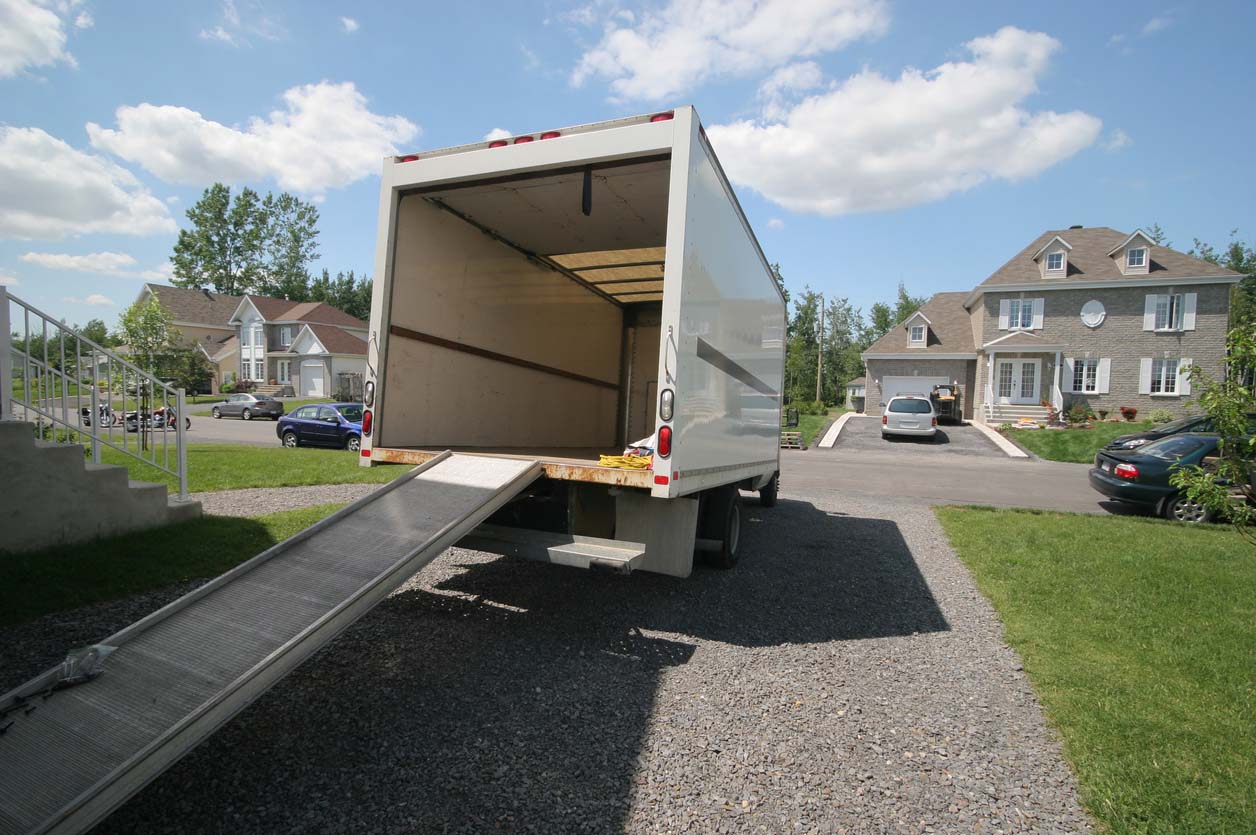
What to Consider When Choosing One of the Best Moving Truck Rental Companies
When vetting some of the best rentals for moving trucks, there are some crucial factors customers need to pay attention to. Ahead, learn more about the attributes one should consider when shopping for the best truck rental.
Reservation Process
Customers should plan as far ahead as possible to ensure they’re able to reserve a truck for their moving date. Most truck reservation companies allow customers to make reservations online using a credit card. Some moving truck companies may not allow you to make a reservation, and customers will have to visit the location on the day of the move to see if any vehicles are available. These companies may not be the best choice for customers working on tight schedules and must guarantee a vehicle is available on a specific date.
Pickup Location Availability and Hours
Since truck rental companies have brick-and-mortar locations with set business hours, customers will want to check and see if the company’s hours work with their moving schedule. While most moving companies will allow customers to return vans during off hours, customers will typically need to pick up the van while the business is open. However, there are some companies that allow the customer to conduct pickups even when the rental office is closed.
Checking location is also crucial. If customers aren’t moving locally, they’ll want to consider not only how close the van pickup is to their starting point but also how far they’ll have to drive to return the van when they reach their destination. Some companies may even require the customer to return the van to the same location they rented it from, which is not ideal for customers moving long distances.
Deposit Requirements and Pricing
Moving truck rental companies generally charge customers a flat fee along with a per-mile rate, both of which vary depending on the size of the truck. Daily rates can range from between $20 and $100 per day. The cheapest moving truck rental can cost as little as 20 cents per mile, and other companies may charge as much as $1.30 per mile. Many moving companies also require their customers to put down a refundable deposit to cover any damage the truck may incur while it’s in the customer’s possession.
When choosing the best rental for moving, it’s crucial to calculate cost as it pertains to the distance of the move. While one company’s rate structure may be more affordable for a local move, another’s might make sense for a long-distance move. Customers should also pay close attention to dates, as some companies change their rates based on the day of the week. Rental rates during off-peak midweek dates can be significantly more affordable than a Saturday or Sunday, when moving trucks are in higher demand. Customers renting a van for more than one day may also receive a different per-day rate on subsequent days.
Minimum Renter Age and Insurance Requirements
Most moving companies require their customers to be at least 18 years old to rent a moving truck, and all drivers must show proof of insurance. Since many car insurance companies don’t cover large truck rentals, customers may want to consider purchasing supplemental insurance. Many moving truck companies also offer various protection options for additional fees, including damage waivers that cover any damage to the truck or the equipment, cargo coverage for any damage that may result from a collision or other accident, medical coverage for accidents, and liability coverage for damage to a third party that results from an accident with the truck.
Vehicle Size Options
Moving trucks are measured in lengths and range from small 9-foot cargo vans to 26-foot trucks. A 26-foot truck can carry a maximum of 26,000 pounds, which is the maximum allowable weight a driver without a commercial driver’s license (CDL) can legally operate. Customers can calculate the size they need based on the number of rooms in their home. Generally speaking, each room will take up between 6 and 10 feet in a moving truck. Therefore, a 10-foot moving truck is suitable for a small studio apartment, while a home with four or more bedrooms requires a 26-foot truck. Some companies may offer additional vehicles like pickup trucks or stakebed trucks.
Vehicle Features and Moving Accessories
In addition to the moving truck itself, many moving companies also offer accessories to help with the move. Tow dollies and car carriers allow the customer to haul their car with them, eliminating the need to double back for the car or find someone else to drive it. Most moving companies also offer moving supplies, including padded blankets to protect furniture during the move and dollies to help with moving boxes and furniture to and from the truck. Some moving companies also sell sturdy moving boxes for packing.
Professional Mover Availability
While moving trucks are designed mainly for customers who want to handle the move themselves, many companies give customers the option to hire movers who will help with the loading and unloading process for an additional fee. Customers who want this service can check and see if the moving company offers this option and include this feature on their reservation when selecting a service.
Refueling Requirements
Some moving companies require the user to refill the tank with gas before they return it to avoid additional fees. Customers will want to check with the moving company to see if they need to completely fill the tank or refill it back to the same level it was at when they picked up the truck.
Cancellation Policy
Most moving companies require the customer to make a deposit to reserve the truck. This deposit could range from $50 to $150. Customers can typically cancel their reservation up to 24 hours in advance without losing their deposits. Some companies offer free cancellation at any time. Customers will want to double-check the cancellation policy when making a reservation, especially if there’s a chance that their moving date could change.
Our Top Picks
The list below includes some of the best known and most reputable names in moving truck rentals. These companies offer a broad range of size options and some of the cheapest moving trucks for both local and long-distance moves.
Best Overall
U-Haul
Pros
- Convenient Truck Share 24/7 self-service available to all U-Haul customers
- Gentle-Ride suspension for smoother driving
- Relatively affordable cost for moves under 100 miles
- 21,000 rental locations nationwide
- 18 mpg maximum for cargo vans
- No deposits required for credit card payments
Cons
- Per-mile payment structure may not be cost-effective for moves over 100 miles
- Truck size options: Pickup, cargo van, 10-foot truck, 15-foot truck, 17-foot truck, 20-foot truck, 26-foot truck
- Reservation process: Online
- Professional movers availability: Yes
- Deposit required: $100 for cash payments; no deposit required for credit card payments
- Sample pricing for 9-foot cargo van: $19.95 for 1 day plus $1.29 per mile
- Cancellation policy: 24 hours in advance
Why It Made the Cut: U-Haul is a well-known truck rental company with thousands of locations nationwide, an established reputation, and affordable rates. All of these factors come together to make it one of the best truck deals for moving. Perhaps one of the best known names in moving truck rental is U-Haul—and it’s for good reason. The company has more than 75 years in the business and boasts some 21,000 locations nationwide, making it one of the largest and most well-established truck rental companies in the country. The company also has features customers will like, including the ability to pick up and drop off a truck when the location is closed, thanks to Truck Share 24/7. U-Haul’s trucks feature Gentle-Ride suspension, making them smooth and easy to drive. U-Haul doesn’t require a deposit for customers who pay by credit card, and it also offers gas-efficient cargo vans that get up to 18 miles per gallon (mpg) and are great for smaller moves. While the per-mile rate might not be the most cost-effective for moves over 100 miles, U-Haul is a very affordable choice for customers who are moving 100 miles or less.
Best for Long Distances
Penske
Pros
- Free unlimited one-way mileage
- Free cancellations
- Convenient Moving Truck Wizard tool assis
- ts customers with vehicle selection
- EPA SmartWay program member
Cons
- Price may be relatively high for short-distance moves
- Truck size options: Cargo van, 12-foot truck, 16-foot truck, 22-foot truck, 26-foot truck
- Reservation process: Online
- Professional movers availability: Yes
- Deposit required: Varying amount for round-trip rentals
- Sample pricing for 9-foot cargo van: $39.99 for 1 day plus $0.99 per mile
- Cancellation policy: Free cancellation any time
Why It Made the Cut: Penske’s flat 1-day rate makes it an economical choice for long-distance moves. Penske uses a flat rate for its one-way truck rentals as opposed to mileage rate, making it a good choice for longer moves. For example, with a flat 1-day rate of $299, one would need to travel at least 200 miles to beat the rates of moving companies that use a mileage rate. Scheduling service with Penske is made easier with its online Moving Truck Wizard, which helps customers select the right size vehicle for their move. Penske is also a member of the Environmental Protection Agency’s SmartWay program, which reduces the carbon footprint of its trucks by improving its supply chain efficiency. The company also offers free cancellations at any time, which is helpful if an unexpected situation arises that requires a customer to move or cancel their moving date.
Best Bang for the Buck
Budget Truck Rental
Pros
- Consistent discount promotions and deals
- Discounted rates available for flexible moving dates
- Discounts available for students, AAA, AARP, military, and first responders
Cons
- Prices can vary significantly depending on booking date
- Truck size options: Cargo van, 12-foot truck, 16-foot truck, 26-foot truck
- Reservation process: Online
- Professional movers availability: Yes
- Deposit required: $150 at time of rental
- Sample pricing for 9-foot cargo van: $29.99 for 1 day plus $0.79 per mile
- Cancellation policy: 24 hours in advance
Why It Made the Cut: Looking for a cheap moving truck rental? With its numerous promotions and low per-mile rate, it’s hard to rival Budget Truck Rental’s prices. Discounts are plentiful with the aptly named Budget truck rental service. The company charges just $29.99 plus 79 cents per mile for its 9-foot cargo van. However, it is important to note that Budget increases its prices for peak dates, which can increase the rate a customer pays dramatically. The company regularly offers promotions that make its rental service more affordable, and these are easily located in the Deals tab at the top of the Budget web page. Budget offers cheaper rates for non-peak dates, and customers with flexible moving dates can also score additional discounts. Budget, which has 2,800 locations nationwide, also offers reduced rates for students, AAA members, AARP members, military, and first responders.
Best for Quick Moves
The Home Depot
Pros
- 75-minute rentals available for relatively low prices
- Free unlimited mileage
Cons
- No option to hire professional movers
- No online reservation available for cargo vans
- Vehicles typically must be returned to original location
- Truck size options: Flatbed truck, cargo van, moving box trucks
- Reservation process: No reservations for pickups and cargo vans; truck reservations online through Penske
- Professional movers availability: No
- Deposit required: $150 at time of rental
- Sample pricing for 9-foot cargo van: $129 per day with free unlimited mileage
- Cancellation policy: N/A for pickups and cargo vans; free cancellation any time for trucks
Why It Made the Cut: The Home Depot offers affordable hourly and daily rates, making it a great option for local moves. The Home Depot is a retail giant, and it’s also a resource to rent moving vans and trucks. The company charges a flat rate with unlimited free mileage for its flatbed pickup trucks and cargo vans. Trucks and vans can also be rented for periods as short as 75 minutes, which is a great solution if a customer is moving within their neighborhood. Customers can also rent Penske trucks from select Home Depot locations. The Home Depot requires customers to return vans and trucks to the same location they picked up from. The Home Depot also does not accept reservations on its cargo vans, and there’s no option to hire moving assistance. However, for customers who are near a Home Depot store and can benefit from the service’s affordable, flexible rates for a local move, The Home Depot is a solid choice.
Best Vehicle Selection
Enterprise
Pros
- Wide selection of 17 vehicle size options
- Relatively low cost per mile
Cons
- No option to hire additional moving labor
- Towing only available at select locations
- Vehicles typically must be returned to original location
- Somewhat limited weekend availability
- Truck size options: Pickup, cargo van, stakebed truck, 15-foot truck, 16-foot truck, 20-foot truck, 24-foot truck, 26-foot truck
- Reservation process: Online
- Professional movers availability: No
- Deposit required: Varies by location
- Sample pricing for 9-foot cargo van: $49.99 per day plus $0.20 per mile
- Cancellation policy: 24 hours in advance
Why It Made the Cut: With its 17 vehicle size options, Enterprise has a variety of truck options to suit any moving needs. Enterprise’s fleet of rental vehicles includes 17 different options, including pickup trucks, cargo vans, and four different lengths of box trucks. This selection means there’s the perfect size to suit any customer. The 20-cents-per-mile rate makes Enterprise a relatively affordable option. However, the company requires customers to return the truck to the pickup location, and weekend availability may be limited. The company also only offers towing options at some of its locations, and it does not offer an option to hire help for loading and unloading the truck. But for customers making a local move and who have an Enterprise location nearby, the company is a reliable choice for moving truck rentals.
Our Verdict
With its low prices, vast number of locations and a reputation that covers more than 70 years, U-Haul is the best truck rental company in the business. Penske’s rate structure makes it an ideal choice for long-distance movers, and we appreciate its free cancellation policy.
How We Chose the Best Moving Truck Rental Companies
We used a variety of criteria to create our list of the top moving truck rental companies. A moving truck rental company should be able to serve a broad area while meeting the needs of various-size homes, so we chose nationwide companies that offer a variety of truck types. Most customers who choose to rent a moving truck versus a moving company do so because they’re trying to save money, so we included both companies that are ideal for longer moves as well as those that will help customers maximize savings for local moves. We obtained quotes from all of these companies and compared the same vehicles, moving dates, and trip features to verify pricing. Reputation is also important, and customers will want to ensure that the trucks are safe to drive and won’t break down mid-move. Because of this, we selected truck rental companies with well-established reputations.
Before You Use One of the Best Moving Truck Rental Companies
Before renting a moving truck for a move, it’s important to consider whether truck rental or one of the best moving companies is the best option. Hiring a moving truck means the customer will be doing all the driving. If there is a car that must also make the move, the customer will either need to tow that vehicle behind the truck or have another person drive it. The customer is also responsible for loading and unloading the truck or hiring professionals to do that work. A moving company, in comparison, will take care of loading and unloading all boxes and furniture at both ends of the move. Rental trucks also have space limitations. While moving companies can operate larger trucks with the capacity to handle virtually any size move, the largest vehicle a rental truck company will rent is 26 feet, which may not offer enough space for larger homes.
Cost of Using One of the Best Moving Truck Rental Companies
The cost to move can be high. Rental moving trucks offer a budget-priced option for those who don’t want to pay for an expensive professional moving service. The price difference is significant. Renting a truck for a local move of 50 miles only costs an average of $130, and a long-distance move of 1,750 miles will cost about $2,000. In comparison, the cost to hire movers is an average $1,250 for a local move and about $5,000 for a long-distance move. Keep in mind that rental costs can vary from company to company, and some moving truck rental companies change their rates depending on the day of the week or time of the year.
The Advantages of Using One of the Best Moving Truck Rental Companies
There are many advantages to renting a moving truck versus hiring a moving service. First and foremost, customers can save hundreds or thousands of dollars on the move by renting a truck and driving it themselves. By renting a truck, customers can also better monitor their belongings, ensuring prized possessions survive the journey unscathed. For long-distance moves, there won’t be a delay between the customer’s arrival and the arrival of the moving truck. Reputable national companies maintain their vehicles, ensuring they’re reliable and safe to drive. A national moving truck service also has locations throughout the country, which can make it easier to return the truck after a longer move.
- Customers can save hundreds or thousands of dollars over a professional moving service.
- Customers can better monitor possessions during the move.
- Reputable companies maintain their fleet, making the trucks safe and reliable.
- Customers and their possessions arrive at the destination at the same time.
FAQs
If you’re wondering how old you have to be to rent a moving truck or what size truck you need for your move, then read on for answers to these and other questions about moving trucks.
Q. How old do I have to be to rent a moving truck?
Most truck rental companies require customers to be at least 18 years old to rent a moving truck. However, state legislations and a few moving truck companies may have higher age requirements. When in doubt, customers can reach out to a moving truck rental company to determine its individual age requirement.
Q. What size rental truck do I need?
A 10- to 12-foot truck is adequate for a small studio apartment. Rent a 15-foot truck for a one- to two-bedroom home and a 17-foot truck for a two- to three-bedroom home. For larger homes with four or more bedrooms, you’ll need a 26-foot truck.
Q. What is the gas mileage of a rental moving truck?
Large moving trucks typically get between 8 and 14 miles per gallon whereas smaller trucks have better mileage. Some of the best cargo vans get as much as 19 miles per gallon.
Q. Can I cancel my moving truck rental reservation?
You can cancel your moving truck rental reservation but, depending on the company, you may have a cut-off time. Many moving truck rental companies will allow you to cancel up to 24 hours before the rental.
Q. Is it cheaper to rent a moving truck one-way or round trip?
If you’re planning on a longer move, it makes more sense to go with a one-way truck rental versus a round-trip rental. Not only will the round-trip rental cover more mileage and potentially more days, costing you more money, it also requires you to drive farther.
Q. Do moving truck rental companies charge per mile?
Most moving truck rental companies charge per mile on top of a flat fee. This flat fee and mileage rate is typically dependent upon the size of the truck. There are some companies that charge a higher flat fee with unlimited mileage.
